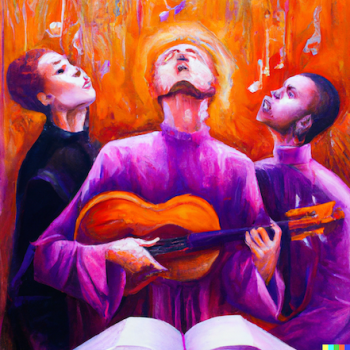Lectionary Reflections on Matthew 22:1-14
Sunday, October 9, 2011
The Parable of the Wedding Banquet
I vastly prefer Luke's version of the parable of the banquet to Matthew's. Luke's (14:15-24) has a happy ending. It doesn't include acts of reciprocal violence like Matthew's does. It doesn't say that the invited guests made light of the invitation, seized the master's slaves, mistreated and killed them. It doesn't tell us that the enraged king then sends troops to destroy those murderers and burn their city. And it omits the lovely little story that Matthew adds to the parable (22:11-14), one that, on the surface, seems to be about a psychotic king obsessed with the wedding attire of his guests.
That story reminds me of the time I flew from Dallas, Texas, to Harrisburg, Pennsylvania, to attend an ordination service. Halfway through the flight, I realized I had forgotten to pack my robe and stole. I did not have the appropriate liturgical garb for the procession. But when I arrived at Messiah College in Grantham, where the service was to be held, my clergy colleagues greeted me warmly. They did not bind and gag me and stuff me in the closet for this infraction! Though we'll see there are reasons for the king's actions in Matthew when we look at the context more fully, I'd still bet most people prefer Luke's version of this parable to Matthew's.
A Plain Old Banquet: The parable in the non-canonical gospel of Thomas and in Luke
In Luke, it's a plain old banquet, not a wedding feast. The parable of the Feast is found in the Gospel of Thomas in a simpler form than it appears in either Matthew or Luke. The Gospel of Thomas is a non-canonical collection of Jesus' sayings that was discovered in Nag Hammadi, Egypt in 1945. Almost half of its sayings are in the synoptic gospels. It shows the tendency of other sayings collections, such as the Q document (material found in Matthew and Luke but not in Mark) to provide parables without allegorical interpretation. In the Gospel of Thomas version, a man prepared a dinner and sent his servant to invite the guests. Each of several guests informs the servant that something has come up (a business meeting, buying a house, marriage, buying a farm) and they ask to be excused. The servant reports this to the master, who then instructs him to go out into the streets and bring back those he happens to meet so that they may dine. The closing line is, "Businessmen and merchants will not enter the Places of My Father." The version in the Gospel of Thomas is similar to Luke's. Both describe a banquet, not a wedding feast as in Matthew. Thomas' closing comment about businessmen and merchants reveals his theology of rejecting worldly activity (Donahue, 93).
This brief version contains the structure that shows up in all three versions: Thomas, Luke and Matthew. A man prepares a feast to which guests have been invited earlier. When the servant goes out to announce that the feast is about to begin, the invited guests offer various excuses. The one giving the feast then substitutes for the invited guests people chosen at random.
Matthew and Luke probably received this parable from the sayings collection Q. There is much material that is used by Matthew and Luke but largely missing from Mark. Some scholars call this the Q document. Q stands for the German quelle, which means "source." The theory is that this collection of Jesus' sayings may have originated with an itinerant group of Jesus' followers who sought to live by his teachings and spread his message after his death. The urgency of the invitation and the theme of exclusion are thematic in Q. The parable of the banquet in its earliest form may have pointed to the rejection of Jesus' message by his contemporaries and their being replaced by the itinerant group that collected his sayings in the Q collection. The parable in this early form has a double focus. It conveys the vindication of Jesus' offer of forgiveness to tax collectors and sinners after the invited guests (the Jewish leaders) refused. It warns that the decisive moment has come, the feast is near, and a failure to respond will lead to exclusion from the banquet (Donahue, 94).
A Wedding Feast: Matthew's version
Matthew makes this parable into an allegory. The host becomes a king and the feast becomes a feast for his son. Matthew's version, when set next to Luke's, is much more violent with regard to both invited guests and king.





